Given:
public class Emp {
String fName;
String lName;
public Emp (String fn, String ln) {
fName = fn;
lName = ln;
}
public String getfName() { return fName; }
public String getlName() { return lName; }
}
and the code fragment:
List
new Emp (“John”, “Smith”),
new Emp (“Peter”, “Sam”),
new Emp (“Thomas”, “Wale”));
emp.stream()
//line n1
.collect(Collectors.toList());
Which code fragment, when inserted at line n1, sorts the employees list in descending order of fName and then ascending order of lName?
Given the code fragment:
UnaryOperator
List
loanValues.stream()
.filter(lv -> lv >= 1500)
.map(lv -> uo1.apply(lv))//line n2
.forEach(s -> System.out.print(s + “ “));
What is the result?
Given the code fragment:
Map
books.put (1007, “A”);
books.put (1002, “C”);
books.put (1001, “B”);
books.put (1003, “B”);
System.out.println (books);
What is the result?
Given that /green.txt and /colors/yellow.txt are accessible, and the code fragment:
Path source = Paths.get(“/green.txt);
Path target = Paths.get(“/colors/yellow.txt);
Files.move(source, target, StandardCopyOption.ATOMIC_MOVE);
Files.delete(source);
Which statement is true?
Given the code fragment:
List
Predicate
System.out.println(“Searching…”);
return n.contains(“red”);
};
colors.stream()
.filter(c -> c.length() >= 3)
.allMatch(test);
What is the result?
Given the code fragment:
String str = “Java is a programming language”;
ToIntFunction
int x = indexVal.applyAsInt(“Java”);//line n2
System.out.println(x);
What is the result?
Given the content:
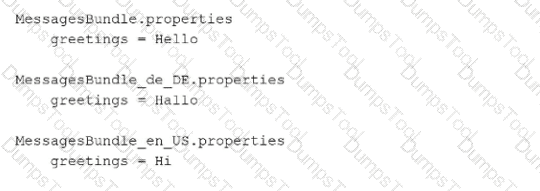
Given the code fragment:

Which two code fragments when inserted at Line 1, independently, enables the code fragment to print "Hallo'?
Assume customers.txt is accessible and contains multiple lines.
Which code fragment prints the contents of the customers.txt file?
Given the code fragment:
List
Predicate
System.out.println(“Searching…”);
return n.contains(“red”);
};
colors.stream()
.filter(c -> c.length() > 3)
.allMatch(test);
What is the result?
In 2015, daylight saving time in New York, USA, begins on March 8th at 2:00 AM. As a result, 2:00 AM becomes 3:00 AM.
Given the code fragment:

Which is the result?
Given:
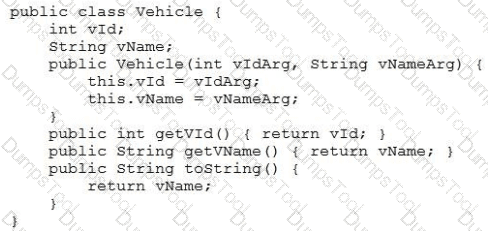
and the code fragment:
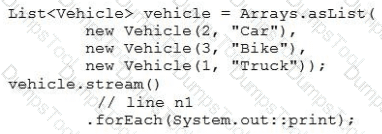
Which two code fragments, when inserted at line n1 independently, enable the code to print TruckCarBike?
Given:
class Worker extends Thread {
CyclicBarrier cb;
public Worker(CyclicBarrier cb) { this.cb = cb; }
public void run () {
try {
cb.await();
System.out.println(“Worker…”);
} catch (Exception ex) { }
}
}
class Master implements Runnable { //line n1
public void run () {
System.out.println(“Master…”);
}
}
and the code fragment:
Master master = new Master();
//line n2
Worker worker = new Worker(cb);
worker.start();
You have been asked to ensure that the run methods of both the Worker and Master classes are executed.
Which modification meets the requirement?
Given the code fragments:
class Employee {
Optional
address;Employee (Optional
address) {this.address = address;
}
public Optional
getAddress() { return address; }}
class Address {
String city = “New York”;
public String getCity { return city: }
public String toString() {
return city;
}
}
and
Address address = new Address;
Optional
addrs1 = Optional.ofNullable (address);Employee e1 = new Employee (addrs1);
String eAddress = (addrs1.isPresent()) ? addrs1.get().getCity() : “City Not
available”;
System.out.println(eAddress);
What is the result?
The data.doc, data.txt and data.xml files are accessible and contain text.
Given the code fragment:
Stream
Paths. get(“data.txt”),
Paths. get(“data.xml”));
paths.filter(s-> s.toString().endWith(“txt”)).forEach(
s -> {
try {
Files.readAllLines(s)
.stream()
.forEach(System.out::println); //line n1
} catch (IOException e) {
System.out.println(“Exception”);
}
}
);
What is the result?
Given the code fragment:
ZonedDateTime depart = ZonedDateTime.of(2015, 1, 15, 3, 0, 0, 0, ZoneID.of(“UTC-7”));
ZonedDateTime arrive = ZonedDateTime.of(2015, 1, 15, 9, 0, 0, 0, ZoneID.of(“UTC-5”));
long hrs = ChronoUnit.HOURS.between(depart, arrive); //line n1
System.out.println(“Travel time is” + hrs + “hours”);
What is the result?
Given the code fragment:
BiFunction
System.out.println(val.apply(10, 10.5));
What is the result?
Given the code fragment:
Path path1 = Paths.get(“/app/./sys/”);
Path res1 = path1.resolve(“log”);
Path path2 = Paths.get(“/server/exe/”);
Path res1 = path2.resolve(“/readme/”);
System.out.println(res1);
System.out.println(res2);
What is the result?
Given the code fragment:

and the information:
The required database driver is configured in the classpath.
The appropriate database is accessible with the dbURL, username, and passWord exists.
What is the result?
Given that these files exist and are accessible:
/sports/info.txt
/sports/cricket/players.txt
/sports/cricket/data/ODI.txt
and given the code fragment:
int maxDepth =2;
Stream
maxDepth,
(p, a) -> p.getFileName().toString().endsWith (“txt”),
FileVisitOption.FOLLOW_LINKS);
Long fCount = paths.count();
System.out.println(fCount);
Assuming that there are NO soft-link/symbolic links to any of the files in the directory structure, what is the result?
Given:
class Vehicle {
int vno;
String name;
public Vehicle (int vno, String name) {
this.vno = vno,;
this.name = name;
}
public String toString () {
return vno + “:” + name;
}
}
and this code fragment:
Set
vehicles.add(new Vehicle (10123, “Ford”));
vehicles.add(new Vehicle (10124, “BMW”));
System.out.println(vehicles);
What is the result?
Which two code blocks correctly initialize a Locale variable? (Choose two.)
Given:
class RateOfInterest {
public static void main (String[] args) {
int rateOfInterest = 0;
String accountType = “LOAN”;
switch (accountType) {
case “RD”;
rateOfInterest = 5;
break;
case “FD”;
rateOfInterest = 10;
break;
default:
assert false: “No interest for this account”; //line n1
}
System.out.println (“Rate of interest:” + rateOfInterest);
}
}
and the command:
java –ea RateOfInterest
What is the result?
Given:

Which two interfaces can you use to create lambda expressions? (Choose two.)
Given the code fragments:
class Employee {
Optional
address;Employee (Optional
address) {this.address = address;
}
public Optional
getAddress() { return address; }}
class Address {
String city = “New York”;
public String getCity { return city: }
public String toString() {
return city;
}
}
and
Address address = null;
Optional
addrs1 = Optional.ofNullable (address);Employee e1 = new Employee (addrs1);
String eAddress = (addrs1.isPresent()) ? addrs1.get().getCity() : “City Not
available”;
What is the result?
Given the code fragment:
List
empDetails.stream()
.filter(s-> s.contains(“r”))
.sorted()
.forEach(System.out::println); //line n1
What is the result?
Given:
class CheckClass {
public static int checkValue (String s1, String s2) {
return s1 length() – s2.length();
}
}
and the code fragment:
String[] strArray = new String [] {“Tiger”, “Rat”, “Cat”, “Lion”}
//line n1
for (String s : strArray) {
System.out.print (s + “ “);
}
Which code fragment should be inserted at line n1 to enable the code to print Rat Cat Lion Tiger?
Given the code fragment:

Which code fragment, when inserted at line 7, enables printing 100?
Given:

and

Which interface from the java.util.function package should you use to refactor the class Txt?
Given the structure of the EHF and DEPT tables:

Given the code fragment:

What is the result?
Given the definition of the Employee class:
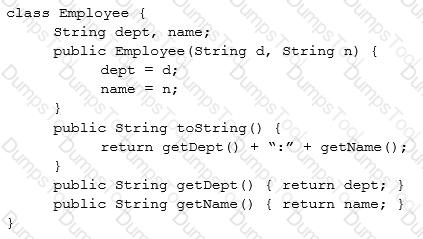
and this code fragment:

What is the result?
Given the code fragment:
public class Foo {
public static void main (String [ ] args) {
Map
unsortMap.put (10, “z”);
unsortMap.put (5, “b”);
unsortMap.put (1, “d”);
unsortMap.put (7, “e”);
unsortMap.put (50, “j”);
Map
Comparator
@Override public int compare (Integer o1, Integer o2) {return o2.compareTo
(o1); } } );
treeMap.putAll (unsortMap);
for (Map.Entry
System.out.print (entry.getValue () + “ “);
}
}
}
What is the result?
Given the code fragment:
public static void main (String [ ] args) throws IOException {
BufferedReader br = new BufferedReader (new InputStremReader (System.in));
System.out.print (“Enter GDP: “);
//line 1
}
Which code fragment, when inserted at line 1, enables the code to read the GDP from the user?
Given:
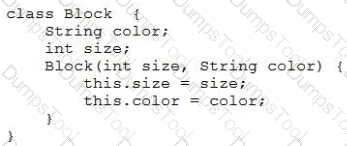
and the code fragment:

Which definition of the ColorSorter class sorts the blocks list?
Given the code fragments:
public class Book implements Comparator
String name;
double price;
public Book () {}
public Book(String name, double price) {
this.name = name;
this.price = price;
}
public int compare(Book b1, Book b2) {
return b1.name.compareTo(b2.name);
}
public String toString() {
return name + “:” + price;
}
}
and
List
Guide to Java Tour”, 3));
Collections.sort(books, new Book());
System.out.print(books);
What is the result?
Which two statements are true about localizing an application? (Choose two.)
Given the code fragments:
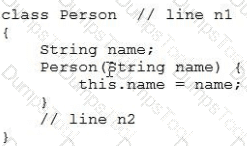
and

Which two modifications enable to sort the elements of the emps list? (Choose two.)
Given the code fragments:
class Caller implements Callable
String str;
public Caller (String s) {this.str=s;}
public String call()throws Exception { return str.concat (“Caller”);}
}
class Runner implements Runnable {
String str;
public Runner (String s) {this.str=s;}
public void run () { System.out.println (str.concat (“Runner”));}
}
and
public static void main (String[] args) InterruptedException, ExecutionException {
ExecutorService es = Executors.newFixedThreadPool(2);
Future f1 = es.submit (new Caller (“Call”));
Future f2 = es.submit (new Runner (“Run”));
String str1 = (String) f1.get();
String str2 = (String) f2.get();//line n1
System.out.println(str1+ “:” + str2);
}
What is the result?
Given:
public class product {
int id; int price;
public Product (int id, int price) {
this.id = id;
this.price = price;
}
public String toString() { return id + “:” + price; }
}
and the code fragment:
List
new Product (2, 30),
new Product (2, 30));
Product p = products.stream().reduce(new Product (4, 0), (p1, p2) -> {
p1.price+=p2.price;
return new Product (p1.id, p1.price);});
products.add(p);
products.stream().parallel()
.reduce((p1, p2) - > p1.price > p2.price ? p1 : p2)
.ifPresent(System.out: :println);
What is the result?
Given:
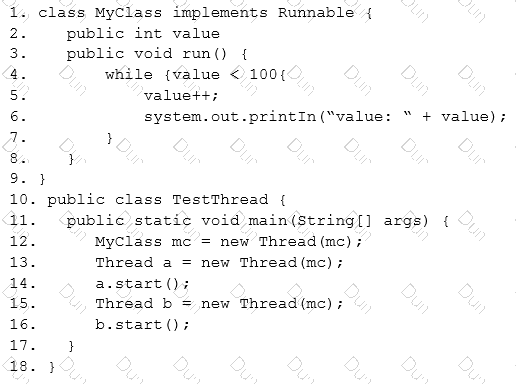
What change should you make to guarantee a single order of execution (printed values 1 -100 in order)?
Given that course.txt is accessible and contains:
Course : : Java
and given the code fragment:
public static void main (String[ ] args) {
int i;
char c;
try (FileInputStream fis = new FileInputStream (“course.txt”);
InputStreamReader isr = new InputStreamReader(fis);) {
while (isr.ready()) { //line n1
isr.skip(2);
i = isr.read ();
c = (char) i;
System.out.print(c);
}
} catch (Exception e) {
e.printStackTrace();
}
}
What is the result?
Given:
Item table
• ID, INTEGER: PK
• DESCRIP, VARCHAR(100)
• PRICE, REAL
• QUANTITY< INTEGER
And given the code fragment:
9. try {
10.Connection conn = DriveManager.getConnection(dbURL, username, password);
11. String query = “Select * FROM Item WHERE ID = 110”;
12. Statement stmt = conn.createStatement();
13. ResultSet rs = stmt.executeQuery(query);
14.while(rs.next()) {
15.System.out.println(“ID:“ + rs.getInt(“Id”));
16.System.out.println(“Description:“ + rs.getString(“Descrip”));
17.System.out.println(“Price:“ + rs.getDouble(“Price”));
18. System.out.println(Quantity:“ + rs.getInt(“Quantity”));
19.}
20. } catch (SQLException se) {
21. System.out.println(“Error”);
22. }
Assume that:
The required database driver is configured in the classpath.
The appropriate database is accessible with the dbURL, userName, and passWord exists.
The SQL query is valid.
What is the result?
Given the code fragment:
Stream
Arrays.asList (“1”, “John”),
Arrays.asList (“2”, null)0;
Stream<
nInSt.forEach (System.out :: print);
What is the result?
Given:
Item table
• ID, INTEGER: PK
• DESCRIP, VARCHAR(100)
• PRICE, REAL
• QUANTITY< INTEGER
And given the code fragment:
9. try {
10.Connection conn = DriveManager.getConnection(dbURL, username, password);
11. String query = “Select * FROM Item WHERE ID = 110”;
12. Statement stmt = conn.createStatement();
13. ResultSet rs = stmt.executeQuery(query);
14.while(rs.next()) {
15.System.out.println(“ID:“ + rs.getString(1));
16.System.out.println(“Description:“ + rs.getString(2));
17.System.out.println(“Price:“ + rs.getString(3));
18. System.out.println(Quantity:“ + rs.getString(4));
19.}
20. } catch (SQLException se) {
21. System.out.println(“Error”);
22. }
Assume that:
The required database driver is configured in the classpath.
The appropriate database is accessible with the dbURL, userName, and passWord exists.
The SQL query is valid.
What is the result?